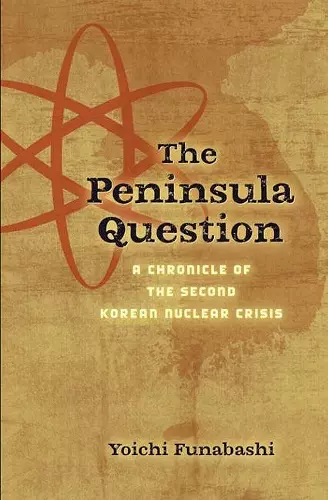The Peninsula Question
A Chronicle of the Second Korean Nuclear Crisis
Format:Paperback
Publisher:Bloomsbury Publishing PLC
Published:30th Oct '07
Currently unavailable, our supplier has not provided us a restock date

"This is an indispensable source for future historians. Truly an internationally top-level opus describing the modern history of Korea." --Makoto Iokibe, President, National Defense Academy of Japan
In October 2002 the United States confronted North Korea with suspicions that Pyongyang was enriching uranium in violation of the Agreed Framework that the nations had worked out during the Clinton administration.In October 2002 the United States confronted North Korea with suspicions that Pyongyang was enriching uranium in violation of the Agreed Framework that the nations had worked out during the Clinton administration. North Korea subsequently evicted international monitors and resumed its nuclear weapons program. The Peninsula Question chronicles the resulting second Korean nuclear crisis.
Japanese journalist Yoichi Funabashi, informed by interviews with more than 160 diplomats and decision makers from China, Japan, Russia, South Korea, and the United States, provides a behind-the-scenes look at the negotiations to denuclearize the peninsula. Between 2002 and 2006, a series of top level diplomats, including the prime minister of Japan, attempted to engage with North Korea. Funabashi illustrates how the individual efforts of these major powers laid the groundwork for multilateral negotiations, first as the trilateral meeting and then as the Six-Party Talks. The first four rounds of talks (2003–2005) resulted in significant progress. Unfortunately, a lack of implementation after that breakthrough ultimately led to North Korea's missile tests in July and subsequent nuclear tests in October 2006.
The Peninsula Question provides a window of understanding on the historical, geopolitical, and security concerns at play on the Korean peninsula since 2002. Offering multiple perspectives on the second Korean nuclear crisis, it describes more than just the U.S. and North Korean points of view. It pays special attention to China's dealings with North Korea, providing rare insights to into the decision-making processes of Beijing. This is an important, authoritative resource for understanding the crisis in Korea and diplomacy in Northeast Asia.
"This book is both deep and interesting.... [A] unique aspect is its account of hard issues like HEU and abduction by means of human-interest storytelling." —Choi Wonki, Joongang Ilbo
|"This is a masterful book for concerned citizens to appreciate the critical aspects of the second nuclear crisis on the Korean peninsula. It is the most comprehensive historical narrative account on the theme." —Saturo Miyamoto, Fellow, Japan Institute of International Affairs
|"This is an indispensable source for future historians. Truly an internationally top-level opus describing the modern history of Korea." —Makoto Iokibe, President, National Defense Academy of Japan
|"An exceptional example of primary-source history, with more than 160 acknowledged interview subjects from seven countries, plus many more anonymous sources. The narrative is built on these interviews, allowing readers to sense the political microclimate as well as the larger issues at play." —James Kelly, The American Interest
|"This book is a useful reference source for understanding why North Korea decided to launch missiles and develop nuclear bombs....It offers diverse perspectives on the behavior of six major players." —Manwoo Lee, Millersville University of Pennsylvania, Asian Affairs, An American Review
|"Presents a compelling behind-the-scenes account of the prime minister's two visits to North Korea. He also provides an in-depth look at the circumstances leading to the creation of the six-party talks as well as the negotiations conducted under that framework up until the North Korean nuclear test of October 2006....Mr. Funabashi's narrative will likely remain for the foreseeable future the most detailed and comprehensive account of the second Korean nuclear crisis." —Martin Laflamme, Far Eastern Economic Review
|"This is an important, authoritative resource for understanding the crisis in Korea and diplomacy in Northeast Asia." — International Institute for Asian Studies
|" The Peninsula Question is a tour de force, drawing on interviews with 160 officials and experts from China, Japan, South Korea, Russia and the United States. This is a wonk's treasure trove, providing minute and fascinating details about who said and wrote what and with what impact, weaving together the perspectives of different participants." —Jeff Kingston, The Japan Times
|"[A] fine new book" —Michael Elliott, TIME
|"A sweeping account of efforts by the United States, China, South Korea, Japan and Russia to engage North Korea and contain its nuclear ambitions, covering the period leading up to former Prime Minister Junichiro Koizumi's visit in 2002 to North Korea's successful underground nuclear test in 2006." — The Asahi Shimbun
|" The Peninsula Question richly chronicles new challenges and missed opportunities underlying the second nuclear crisis in the Korean Peninsula and examines the logic and emotions applied by the parties concerned, namely the current members of the Six-Party talks." — Political Science Quarterly
|"The book offers a rare primer on how diplomacy is conducted -- missteps and all -- and insight into the complex motives that drive the actors. It also reveals some larger themes, including North Korea's skill at dividing its enemies, the depth of Beijing's dissatisfaction with Pyongyang, the ineffectiveness of Washington's tactics, and the unfortunate likelihood that North Korea will never give up its nuclear arms." —Andrew J. Nathan, Foreign Affairs
ISBN: 9780815730101
Dimensions: unknown
Weight: unknown
575 pages